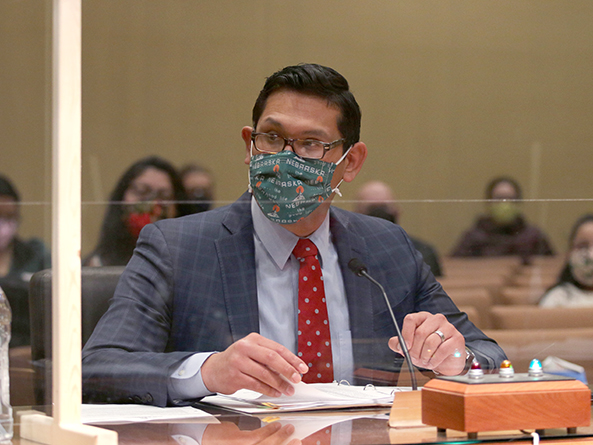Increased protections proposed for meatpacking workers
Members of the Business and Labor Committee heard a bill March 1 that would enact health and safety protections for meatpacking workers during the ongoing coronavirus pandemic.

LB241, sponsored by Omaha Sen. Tony Vargas, would require employers to maintain 6 feet of space around and between each worker, including in common areas like lunch, break and locker rooms.
Vargas introduced a proposal late in the 2020 legislative session that would have incorporated the provisions in LB241 but the effort was unsuccessful. The rejection of that proposal, he said, resulted in increased COVID-19 cases, hospitalizations and deaths among meatpacking workers.
“While we’re incredibly grateful for a vaccine, we are by no means out of the woods just yet,” Vargas said. “The situation is urgent and demands action from all of us. Actually, it demanded actions from us months ago.”
Under the bill, employers would be required to provide all workers with free face masks and shields and must replace them daily or more often as needed. Additionally, employees must have ample opportunity to wash and sanitize their hands. An employee also could request gloves as needed.
Employees would be screened for COVID-19 at the start of each shift, including a temperature check — with the result disclosed to the employee — and either an oral or written questionnaire including questions about possible symptoms and exposure.
If a worker suspects they have been exposed to COVID-19, they could leave the meatpacking operation premises to receive a test on paid work time. Employees displaying COVID-19 symptoms would be allowed to quarantine at home while awaiting test results, although asymptomatic employees could return to work.
The bill also would ensure paid sick leave for an employee who tests positive that would not count against any other paid sick leave owed to the employee. Employees who may have come into direct contact with someone who tests positive must be informed by management of their potential exposure. The protections proposed in LB241 would apply until Dec. 31, 2021.
Tonya Ward, speaking on behalf of the League of United Latin American Citizens, spoke in support of LB241. She said lawmakers must show that they truly care about the health, job safety and well-being of every meatpacking worker in the state.
“Failing to protect them, from COVID especially, contributes to the deadly spread of this virus because what happens to these important employees affects the entire community, including their family, their friends and their neighbors,” Ward said.
Belinda Acosta of Lincoln also supported the bill. Meatpacking workers have been called “heroes,” she said, but have not been provided with basic health and safety protections.
“Creating COVID health and safety protections, as well as providing the sick leave proposed in LB241 … is not a luxury,” Acosta said. “It’s a human right that also makes economic sense.”
The protections in the bill should have been passed in 2020, said Romulo Vega of Lincoln, speaking in support of LB241. Meat processing plants have been given suggestions and guidelines to keep workers safe, he said, but there is no way to enforce those guidelines.
“We, as Nebraskans, pride ourselves on our sense of integrity and value our worth ethic,” Vega said. “For whatever reason, we labeled meatpacking workers as essential workers, but we did not implement the basic, transparent protections against COVID-19 in 2020.”
LB241 also would require meatpacking operation employers to document and track all COVID-19-related deaths and positive cases — broken down by race and ethnicity — and report such results weekly to the state Department of Health and Human Services and Department of Labor, as well as to the Legislature.
The DOL commissioner would be authorized to conduct unannounced workplace inspections, including analyzing employer records and making remedial recommendations. The commissioner could issue a citation if an employer is found to be in violation of the bill’s provisions.
Commissioner of Labor John Albin testified in opposition to the bill. In written testimony, Albin said the federal Occupational Safety and Health Act preempts state-level safety regulations. If the state were to adopt its own regulations, he said, it would have to receive approval from the federal Secretary of Labor.
“The department does not believe it will be feasible to have a full plan submitted and approved by the Secretary of Labor by Dec. 31, 2021,” Albin said. “Additionally, any plan would have to account for enforcement equal to or more stringent than the regulations created [by OSHA].”
Also opposing the bill was Ron Sedlacek, testifying on behalf of the Nebraska Chamber of Commerce and Industry. In written testimony, he said that OSHA and the Centers for Disease Control and Prevention continually have updated their guidance regarding meatpacking workers.
“These ever-evolving guidance documents demonstrate that a ‘one-size-fits-all’ static policy enshrined in law is not the right solution to address worker and workplace safety,” Sedlacek said. “Rather, the ability to update, adjust and respond to evolving circumstances is best left to flexible regulatory guidance documents and health directives.”
Julia Plucker, testifying on behalf of the Nebraska Coalition of Agricultural Manufacturers, opposed the bill in written testimony. She said that the requirement to keep workers 6 feet apart at all times is “unworkable.”
“This will result in reduced operational efficiency, which means slowing production lines and reducing capacity, which will ultimately result in fewer head of cattle being processed, thereby affecting the entire supply chain from the Nebraska cattle producers to the customers,” Plucker said. “An estimate from our plant engineer states that the impact of this section [of LB241] alone would result in a 50 percent reduction of workers and [output].”
The committee took no immediate action on the bill.


